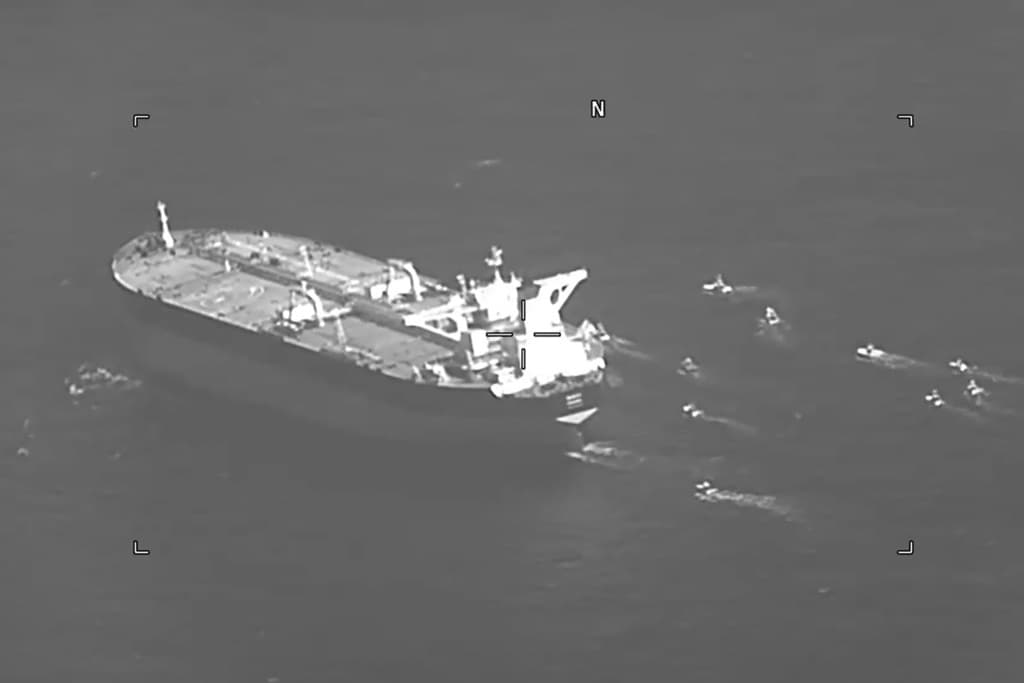Iran Tanker Seizures Seen as Part of Shadow War With America
The Islamic Revolutionary Guards Corps may be retaliating against American interference with an effort to violate Washington sanctions banning Iranian oil exports.

As Tehran escalates an oil tanker war in the Persian Gulf, can America maintain an already loose oil embargo against the Islamic Republic?
Iran seized two oil tankers in the gulf in a week, eliciting rebukes from Washington. According to news reports, the Islamic Revolutionary Guards Corps may be retaliating against American interference with a “shadow fleet” of tankers enlisted in an effort to violate Washington sanctions banning Iranian oil exports.
A Panama-flagged oil tanker, the Niovi, was seized Wednesday by the IRGC’s navy in the straits of Hormuz, the U.S. Navy’s Bahrain-based fifth fleet reported. The seizure followed last Thursday’s similar act against a Marshall Islands-flagged oil tanker, the Advantage Sweet, which is now held by Iranian authorities at Bandar Abbas.
The Financial Times first reported that the seizure of the Advantage Sweet could have been related to an earlier American redirection of a tanker involved in illicit smuggling of Iranian oil to Communist China. The Department of Justice seized the tanker, the Suez Rajan, under a court order, according to the FT.
The initial tip to the DoJ that the Suez Rajan was evading America’s oil embargo against Iran came from United Against Nuclear Iran, an organization that monitors the Islamic Republic’s violations of sanctions. Intercepting the vessel’s oil smuggling seems to have then triggered retaliation, as the IRGC seized oil tankers in the gulf.
We “strongly suspect that the seizure of the Niovi is related to a dispute over a shipment of Iranian oil,” UANI’s chief of staff, Claire Jungman, a “tracker of tricky oil tankers, especially from Iran,” tweeted.
UANI has followed closely the Suez Rajan, Ms. Jungman told the Sun. “According to our ship tracking, the vessel departed Singapore Area on April 4 after anchoring off the Riau Archipelago for over a year with what is suspected to be Iranian oil,” she said. Later, on April 22, the Suez Rajan turned its identification after passing Madagascar, and appeared to be heading for the Atlantic, Ms. Jungman added.
In a seemingly unrelated incident, a Gabon-registered tanker, the Pablo, caught fire on Monday in the South China Sea, off Malaysia. The empty tanker was traveling from China. Built in 1997, the vessel seems to be part of a “vast shadow fleet of aging tankers that has been enlisted to carry sanctioned oil across the globe,” Bloomberg reports.
The Pablo explosion could be unrelated to the brewing shadow war between America and Iran over oil transport. After President Trump abandoned the Joint Comprehensive Plan of Action in 2018, he reimposed onerous sanctions on Iran’s oil, banking, and transportation sectors.
President Biden has dangled the removal of these sanctions in exchange for an Iranian return to the 2015 JCPOA. Tehran declined to seriously negotiate a renewal of the nuclear deal, preferring instead to ramp up its pursuit of nuclear arms. It could afford doing so because Washington’s sanctions enforcement was, at best, spotty.
Communist China is the largest importer of banned Iranian oil. In some months it buys as much as 1.2 million barrels a day. Violating the American oil embargo is a win-win policy for Beijing: It gets oil at a significant discount, which it buys in yuan; and it props up the economy of an ally in the Communist state’s growing network of countries sharing contempt for America’s global leadership.
Washington has been mum so far about its latest attempt at ending the embargo violations. Yet, it condemns the IRGC’s aggression in the gulf.
“Iran’s continued harassment of vessels and interference with navigational rights in regional waters are unwarranted, irresponsible, and a present threat to maritime security and the global economy,” the U.S Navy said in a statement reacting to the Niovi incident, in which a dozen IRGC boats swarmed the tanker Wednesday.
In contrast, neither the Navy nor the DoJ confirmed an American intervention to stop the Suez Rajan or any other attempt to enforce the oil embargo against the Islamic Republic. The Biden administration seems to be wary of an escalation that could lead to direct confrontation with the IRGC.
Tehran is “escalation friendly,” an Iran watcher at the Foundation for Defense of Democracies, Behnam Ben Taleblu, tells the Sun, adding, “Iran’s continued harassment of maritime traffic and threats to international shipping is happening even as oil sanctions are only sporadically being enforced.”
Even as Tehran continuously rebuffs attempts to revive the nuclear deal, the Biden administration’s announcements of new sanctions are rare and far between. Iran hawks at the justice and treasury departments are no match for the army of diplomats, intelligence officials, and White House advisers pushing diplomatic initiatives to appease the Mideast’s most disruptive and belligerent player.
“The question now for Washington is what next and how to respond,” Mr. Ben Taleblu says. As Tehran escalates, expect America to seek accommodation.

